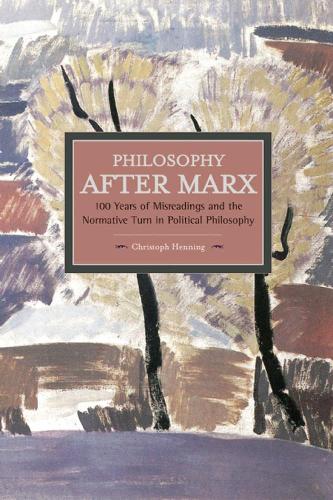
Philosophy After Marx: 100 Years Of Misreadings And The Normative Turn In Political Philosophy: Historical Materialism, Volume 65
(Paperback)
Publishing Details
Philosophy After Marx: 100 Years Of Misreadings And The Normative Turn In Political Philosophy: Historical Materialism, Volume 65
By (Author) Christoph Henning
Haymarket Books
Haymarket Books
12th May 2015
United States
Classifications
General
Non Fiction
Social and political philosophy
193
Physical Properties
Paperback
662
Width 152mm, Height 229mm
904g
Description
In Philosophy After Marx, Christoph Henning writes a concise history of mis-readings of Marx in the 20th century. Focusing on German philosophy from Heidegger to Habermas, he also addresses the influence of Rawls and Neopragmatism, subsequently scrutinizing a previous history of Marx - interpretations that had served as the premises upon which these later works were based. With the recent resurgence of interest in Marx, Henning's historical recursions make evident where and how academic Anti-Marxism had previously got it wrong.
Reviews
Christoph Hennings Philosophy After Marx is a comprehensive, six-hundred page indictment of everyone from Kautsky to present-day left liberals of Habermasian or Rawlsian stripe, and it is well worth standing p to its innumerable provocations. It is a tireless catalogue of what I will call Marx-avoidance, which for all its unremitting zeal remains oddly non-partisan. Fredric Jameson,New Left Review
Christoph Hennings Philosophy After Marx is a comprehensive, six-hundred page indictment of everyone from Kautsky to present-day left liberals of Habermasian or Rawlsian stripe, and it is well worth standing p to its innumerable provocations. It is a tireless catalogue of what I will call Marx-avoidance, which for all its unremitting zeal remains oddly non-partisan. Fredric Jameson,New Left Review
Author Bio
Christoph Henning: Ph.D. (2003), is a philosopher at the University of St. Gallen, Switzerland. He has published widely on economic philosophy, Marxism, and critical theory, and recently wrote a book entitled Political Philosophy of Perfectionism. Fredric Jameson is Distinguished Professor of Comparative Literature at Duke University. The author of numerous books, he has over the last three decades developed a richly nuanced vision of Western cultures relation to political economy.
